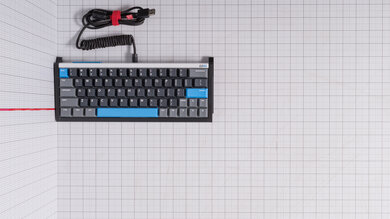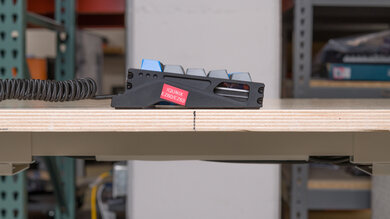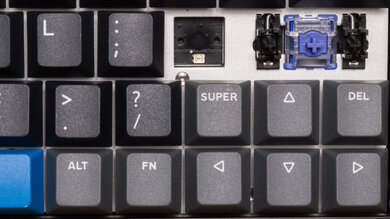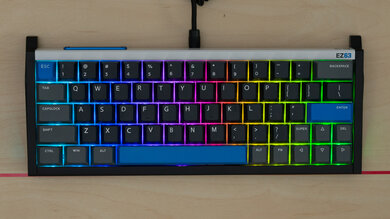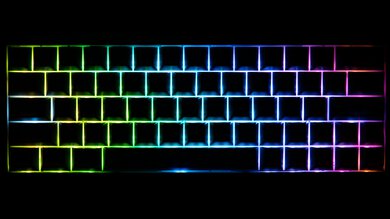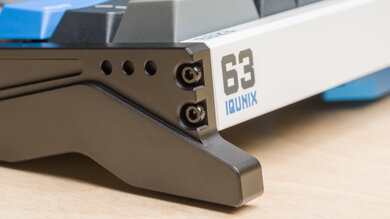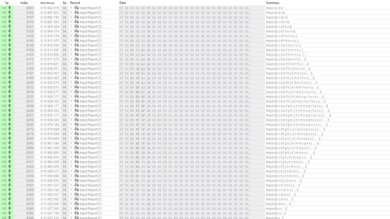The IQUNIX EZ60/EZ63 are compact gaming keyboards with Hall effect switches. They have solid aluminum chassis and gasket mount designs that lend a slightly softer typing experience compared to more common tray-mounted keyboards. Their web-based software supports advanced features like Rapid Trigger, Dynamic Keystrokes, and SOCD, which can offer small but noticeable advantages in certain gaming scenarios, particularly for FPS and rhythm games.
Our Verdict
The IQUNIX EZ60 and EZ63 are excellent gaming keyboards that combine outstanding build quality and raw performance. They're well-suited for competitive play across any genre, and their web-based software lets you fine-tune actuation settings. They also support advanced features like Rapid Trigger, which can provide subtle but meaningful advantages, particularly in fast-paced FPS titles and rhythm games. Both models offer fully addressable per-key RGB backlighting, though the keycaps lack shine-through legends, which can make them harder to read in low-light environments. The keyboards also have a fairly tall profile, so we recommend pairing them with a wrist rest for added comfort during longer sessions.
-
Remarkably low latency.
-
Outstanding build quality.
-
Web-based software allows for customizability and supports advanced features like SOCD and DKS.
-
No shine-through keycap legends so keys are hard to read in dark rooms.
The IQUNIX EZ60 and EZ63 are decent for office work, though they aren't designed with this use in mind. They offer outstanding build quality, a slightly cushioned gasket mount, and pre-lubed switches and stabilizers that contribute to a satisfying and quiet typing experience unlikely to disturb those around you. That said, the compact layouts may take some getting used to. Both variants omit a function row, navigation cluster, and numpad. The EZ63 includes dedicated arrow keys, but this comes at the cost of a much smaller 'Super' key in place of a traditional right Shift. The keyboards also have a tall profile, so while comfortable overall, they may require a wrist rest for extended typing sessions.
-
Outstanding build quality.
-
Excellent typing quality.
The IQUNIX EZ60/EZ63 are wired-only keyboards that aren't suitable for use with tablets or mobile devices.
Although not specifically designed with programming in mind, the IQUNIX EZ60 and EZ63 keyboards are decent options. They offer outstanding build quality, with a premium-feeling aluminum case and a gasket-mounted design that contributes to a slightly softer, more comfortable typing experience. However, their compact layouts may not suit all programming workflows—particularly if you're not comfortable using layers. Both models lack a function row, and while the EZ63 includes arrow keys, it has a 1u-sized 'Super' key in place of a traditional right Shift. Additionally, although the keyboards feature per-key RGB backlighting, the keycaps don't have shine-through legends, making them difficult to read in low-light environments. The overall typing profile is also quite high, so we recommend pairing them with a wrist rest for better comfort during extended sessions.
-
Outstanding build quality.
-
Excellent typing quality.
-
No shine-through keycap legends so keys are hard to read in dark rooms.
-
Compact layout may not be suitable for all programming workflows
The IQUNIX EZ60/EZ63 aren't designed for entertainment or home theater PC setups. They're a wired-only model, so you'll need to be fairly close to your PC to use them. They also lack dedicated media keys, and while they have RGB backlighting, the keycaps lack shine-through legends so you can't read them in darker rooms.
-
Wired-only.
-
No dedicated media keys.
-
No shine-through keycap legends so keys are hard to read in dark rooms.
The IQUNIX EZ60 and EZ63 keyboards offer remarkably strong raw performance, with support for a maximum 8000Hz polling rate and extremely low single-key latency. However, they exhibit some inconsistency when using highly sensitive Rapid Trigger or 'Berserk' mode settings—particularly with multi-key release latency. For more details, see the Multi-Key Latency section
-
Remarkably low latency.
- 8.7 Gaming
- 7.0 Office
- 1.8 Mobile/Tablet
- 7.4 Programming
- 2.1 Entertainment / HTPC
- 9.0 Raw Performance
Changelog
-
Updated May 29, 2025:
We've written text for the new Adjustable Input Granularity box, added with Test Bench 1.4, and we've made sure all text throughout the review reflects any changes.
- Updated May 27, 2025: We've updated this review with our new Test Bench 1.4 methodology. It adds a new Output Type classification in the Switches box, indicating whether the keyboard's output is non-adjustable, adjustable, or analog. It also introduces a new Adjustable Input Granularity test, which improves comparability between keyboards with adjustable input.
- Updated Mar 31, 2025: Review published.
- Updated Mar 20, 2025: Early access published.
- Updated Mar 07, 2025: Our testers have started testing this product.
Check Price
Differences Between Sizes And Variants
The IQUNIX EZ60 and the IQUNIX EZ63 are available in several different switch options and colorways. We bought and tested the default colorway EZ63 model with Gateron Star Trail Magnetic switches. See our unit's label.
| Name | Size | *Switch Options | Color Options |
|---|---|---|---|
| EZ60 | Compact (60%) | Magnetic Star Trail, Magnetic Jade, Magnetic Jade Pro | Unnamed default (black, dark gray, blue) |
| EZ63 | Compact (60%) with dedicated arrow keys | Magnetic Star Trail, Magnetic Jade, Magnetic Jade Pro | Unnamed default (black, dark gray, blue) |
| EZ63 Pink | Compact (60%) with dedicated arrow keys | Magnetic Jade Pro, Pink Jade Pro, Magnetic Jade Gaming | Pink (pink and white) |
| EZ63 White | Compact (60%) with dedicated arrow keys | Magnetic Star Trail, Magnetic Jade, Magnetic Jade Pro, Pink Jade Pro, Magnetic Jade Gaming | White |
| EZ63 White Elf | Compact (60%) with dedicated arrow keys | Magnetic Jade Pro, Magnetic Jade Gaming | White (White with electroplate silver top edge) |
*We've documented the differences between the Magnetic Star Trail and Magnetic Jade/Magnetic Jade Pro switches in the Keystrokes section. Regarding other available switch types, such as the Magnetic Jade Gaming and the Pink Jade Pro, minimal and occasionally conflicting information is available online as to how or if they're different. It's possible that they don't differ in any meaningful way apart from recolored stems and housings.
Compared To Other Keyboards
The IQUNIX EZ60 and IQUNIX EZ63 are compact gaming keyboards with Hall effect switches. They come in at a fairly high-end price point, but the build quality backs it up, with solid aluminum cases, tight fit and finish, and a distinctive look. In terms of performance, they're also top contenders, slightly outperforming flagships from major gaming brands like the Razer Huntsman V3 Pro and SteelSeries Apex Pro Gen 3. That said, they don't quite edge out keyboards, like the NuPhy Field75 HE or the Wooting 80HE, which comes as a bit of a surprise, given that early reports from Computex 2024 and other reviewers suggested near parity with the Wooting in particular (for more context, see the Single-Key Latency section). While the EZ60 and EZ63 offer fairly robust web-based software, they lack some of the depth and refinement found in NuPhy and Wooting's platforms, which still set the bar for gaming keyboard software.
Altogether, these keyboards are an outstanding choice for competitive gaming. And while the software is still relatively basic compared to some other high-end alternatives, it supports popular features like Rapid Trigger and SOCD. They're particularly worth considering if you're in the market for a premium-feeling, aluminum-case keyboard that's somewhat more affordable than models like the Wooting 80HE or Keychron Q1 HE.
For more recommendations, see our picks for the best keyboards, the best gaming keyboards, and the best 60% keyboards.
The Wooting 80HE and the IQUNIX EZ63 are high-end gaming keyboards with Hall effect switches. Both are available with aluminum cases, but the Wooting has a more affordable plastic case version as well. In terms of raw performance, they're closely matched, but the Wooting performs slightly better overall. It also features shine-through keycaps and offers more robust, polished web-based software, along with a fully featured offline client—a capability the IQUNIX notably lacks.
The Wooting 60HE and the IQUNIX EZ63 are compact gaming keyboards with Hall effect switches and comparable overall performance. The IQUNIX features a slightly non-standard 60% layout that includes dedicated arrow keys, which the Wooting lacks. On the other hand, the Wooting comes with shine-through keycaps, more feature-rich software, and a fully functional offline client—a feature the IQUNIX does not offer.
Both the SteelSeries Apex Pro Gen 3 and the IQUNIX EZ63 are gaming keyboards with Hall effect switches. The IQUNIX has noticeably better build quality, featuring a full aluminum frame and a slightly cushioned gasket mount design. It also performs better overall and supports a maximum polling rate of 8000Hz. In comparison, the SteelSeries offers shine-through keycaps, dedicated media keys, and a programmable OLED screen—all features the IQUNIX lacks.
The Razer Huntsman V3 Mini and the IQUNIX EZ63 are gaming keyboards with adjustable actuation switches. The IQUNIX offers better build quality and typing feel, along with slightly stronger overall performance and support for a higher 8000Hz polling rate. It also uses web-based software, while the Razer relies on a downloadable client, which may be frustrating for some users due to its background resource usage.
Test Results
The IQUNIX EZ60 and the IQUNIX EZ63 have a compact layout and a fairly standard normal profile height. They don't take up much space on a desk, leaving plenty of space for dynamic mouse movement.
We bought and tested the IQUNIX EZ63 layout variant, and the only major difference is that it has dedicated arrow keys. The EZ60 variant is a more traditional 60%, which lacks dedicated arrow keys. For an easy-to-reference comparison between the two layouts, see the user guide for these keyboards on the IQUNIX website.
The IQUNIX EZ60 and the IQUNIX EZ63 have outstanding build quality. The chassis is made of aluminum, so there's virtually no deck flexing, and the fit and finish of all pieces is tight without any noticeable gaps or blemishes. However, the metallic finish on the case does make it fairly easy to leave visible fingerprints. If interested, see an image of the underside.
The overall weight of the case also helps keep the keyboard in place, and the extended strut feet along both sides have rubber caps on and do a great job of preventing the board from sliding around on your desk.
The PBT keycaps have a slightly textured finish and feel quite stable with very minimal wobble. The stabilizers are also quite even-feeling, with a consistent sound signature and no rattling.
Additionally, you can make small adjustments to how level and stable your keyboard feels on your desk by tightening screws through the legs on either side with the included hex wrench. For further details, see the Extra Features section.
These keyboards have a fixed incline setting and quite a tall profile that requires you to angle your wrists somewhat to reach the keys. While the angle doesn't feel unnatural or uncomfortable, we recommend using these keyboards with a wrist rest if you plan on gaming or typing for longer periods.
These keyboards have a hot-swappable PCB and support magnetic switches.
The software offers calibration for each particular switch on a list of supported switches. Some magnetic Hall effect switches that aren't listed may function reasonably well, but they may have a small actuation accuracy penalty if they aren't among the calibrated switches included in the software.
Note that you can access and replace the stabilizers without fully deconstructing the keyboard and removing the plate.
The USB-A to USB-C cable is a fairly sturdy-feeling braided cable with a coiled segment closest to the USB-C keyboard-side connector.
It appears that some early units had cables with an aviator connector, but IQUNIX confirms on their FAQ page that the cable on newer models does not have this connector.
These keyboards have metal struts on either side fitted with a pair of bolts. You can loosen or tighten these bolts with the included hex wrench while pressing down on the keyboard to help ensure it sits level on your desk. An illustrated guide demonstrating this feature is included in the box, and you can reference a digital version of this guide on IQUNIX's website.
These keyboards provide excellent typing quality. The keys and switches feel very stable, and both the switches and stabilizers are pre-lubed from the factory. Larger stabilized keys actuate evenly, with minimal wobble and no rattling noise. The gasket mount adds a slightly cushioned feel, though it's noticeably stiffer than what you'd find on many standard gasket-mounted mechanical keyboards.
The sound profile is also very pleasant but fairly muted, as is typical of most Hall effect boards, particularly those with full aluminum cases.
Despite the compact form factor, the key spacing remains standard, so the layout doesn't feel cramped. The IQUNIX EZ63 variant we tested includes dedicated arrow keys, which some typists may appreciate. Just note that it lacks a traditional right Shift key (found on the EZ60 variant) and instead uses a 1u-sized 'Super' key that functions as a right Shift. This may take some getting used to, depending on your typing habits.
These keyboards are fairly quiet and unlikely to bother anyone around you, unless you're in a particularly noise-sensitive environment.
For this test, we produced the measurements using an actuation point setting of 0.1 mm and a Rapid Trigger setting of 0.05 mm (press and release).
We bought the IQUNIX EZ63 with Gateron Magnetic Star Trail switches, but you can also buy these keyboards with Gateron Magnetic Jade or Gateron Magnetic Jade Pro switches.
Both Magnetic Jade switch options are somewhat more lightweight-feeling. The Magnetic Jade Pro switches also allow for a lower advertised actuation distance of 0.005 mm.
The IQUNIX EZ60/EZ63 provides great input granularity with a good detection ratio, which allows you to register inputs across most of the full range of key travel.
It also has relatively small deadzone distances, which makes it easier to make fast initial and follow-up inputs, which is crucial for movement techniques like tap-strafing in some FPS titles.
However, it doesn't support true analog output, which only becomes a limitation if you want to mimic gamepad or joystick inputs in games like platformers or flight sims.
The IQUNIX EZ60/EZ63 keyboards maintain remarkably low single-key latency. They deliver an extremely responsive and consistent in-game experience that is suitable for high-level, competitive gaming.
This test was conducted using the following settings:
- Actuation Point: 0.1 mm
- Rapid Trigger: 0.05 mm (press and release)
- Berserk Mode: enabled
- Bottom-out safety zone: 0.10 mm
- Polling rate 8000Hz
Note: Our results are somewhat unexpected given reports from Computex 2024 and measurements from various reviewers suggesting consistent sub 1 ms single-key latency.
However, it's important to consider these other measurements likely don't account for the physical travel of the switch. They're typically produced by magnetically closing the switch and only measuring the hardware/firmware latency. While this is a valid way to measure latency, it isn't fully representative of the latency you experience when using a keyboard. For more details about our latency methodology, you can check out our test article.
These keyboards offer remarkable multi-key latency performance. They're well-suited for playing games that require additional keystrokes while multiple keys are pressed and maintained.
This test was conducted using the following settings:
- Actuation Point: 0.1 mm
- Rapid Trigger: 0.05 mm (press and release)
- Berserk Mode: enabled
- Bottom-out safety zone: 0.10 mm
- Polling rate 8000Hz
Note that we encountered significant inconsistency in release latency when using Rapid Trigger settings, as can be seen in the graph above.
We performed extensive supplementary testing at various settings as well as extra validation testing with the extra sample Gateron Magnetic Jade Pro switches that come in the box. We found this inconsistency persists using virtually all 'optimized' settings.
That said, turning 'Berserk' mode off and enabling 'Stable' mode instead shows improved stability at the cost of added release latency.
With Rapid Trigger disabled, we also see significantly more stable performance but, as predicted, at a cost of slightly more latency. Note this particular measurement was produced with one of the extra sample Gateron Magnetic Jade Pro switches included in the box.
There are reports of some users experiencing rollover issues or ghosting inputs, even when not touching the keyboard.
IQUNIX has an FAQ page that makes some suggestions to avoid these errors.
The IQUNIX EZ60 and EZ63 keyboards deliver decent 4-chord and strong 8-chord split performance, making them a viable option for rhythm games or other titles that require frequent large strings of simultaneous inputs. However, they don't perform quite as well as some competing Hall effect keyboards, such as the Wooting 80HE or the NuPhy Field75 HE.
These keyboards use a web-based client for configuration, which is compatible with Chromium-based browsers.
Some users will appreciate not having to install a program that consumes system resources on their local machine, but note that there isn't currently an offline downloadable version of this software. You'll want to consider this, as it carries a risk that IQUNIX may end support at some point in the future, leaving owners of these keyboards without a way to change their keyboard settings if IQUNIX doesn't release a downloadable offline version.
Also, note that IQUNIX seems to be actively making changes to this software, so certain features may appear differently than in the video above.
Under the performance tab, you can select which switch type you're using, which determines the actuation range to correspond to the switch type you're using. IQUNIX notes on their FAQ page that they may add support for other switch types in the future.
This keyboard also supports several advanced features related to adjustable actuation input, detailed below:
Rapid Trigger: This setting can dynamically adjust your switches' actuation and reset points based on distance rather than being fixed at a specific point along the keystroke. This allows for faster follow-up inputs, which can be especially beneficial in scenarios like counter-strafing in FPS games.
- The 'Berserk' mode setting allows you to lower Rapid Trigger distance to a minimum of 0.05 mm with Gateron Magnetic Star Trail switches or 0.005 mm with Gateron Magnetic Jade Pro switches.
DKS (Dynamic Keystrokes): Allows you to map up to four different actions to a single key based on actuation distance.
MT (Mod Tap): This is the ability to set two different actions to a single key based on whether you tap or hold down the key.
SOCD (Simultaneous Opposing Cardinal Directions): Monitors a pair of keys to activate based on custom trigger parameters. For example:
- Last input priority: The last pressed key overrides the first if both exceed the actuation point.
- Absolute priority: One key overrides the other if both exceed the actuation point.
The software allows you to set one custom profile but doesn't allow multiple custom profiles. That said, there are separate Office and Esports profiles that are pre-configured with non-customizable actuation settings. Under the Professional Presets tab, you can also choose from a list of presets related to specific esports professionals.
You can switch between Mac and Windows compatibility mode by holding the Fn+tab shortcut for five seconds. The caps lock key blinks to indicate the change. There is also a set of alternate Mac-specific keycaps included in the box.
For Linux users, the software is recognized in Chromium-based browsers but didn't function during our testing. That said, you may still be able to adjust your udev permissions to get this working. If you have this keyboard and use Linux, we'd love to hear about your experience in the comments.
While default functions on the primary layer for these keyboards work as expected in all platforms, we did encounter some unexpected behavior with the IQUNIX EZ63 we tested. Namely, the quick start guide suggests that Fn + arrow keys shortcuts are bound to media controls. However, none of these shortcuts worked for us out of the box for any OS. That said, you can successfully rebind these commands using the software.
Additionally, according to the quick start guide, the Fn+Del shortcut should function as Insert out of the box. However, this shortcut is recognized as Delete. It's worth noting that IQUNIX may be able to rectify these small quirks with future firmware updates.
Comments
IQUNIX EZ60/EZ63: Main Discussion
Let us know why you want us to review the product here, or encourage others to vote for this product.
Update: We’ve written text for the new Adjustable Input Granularity box, added with Test Bench 1.4, and we’ve made sure all text throughout the review reflects any changes.
- 32120
i’m confused as to why this keyboard received a 10/10 in compatibility and is marked as fully Linux compatible given “For Linux users, the software is recognized in Chromium-based browsers but didn’t function during our testing.”
Hey systemctl, Good question.
Our Computer Compatibility test focuses strictly on default hardware functionality—that is, whether the keyboard’s basic functions work as expected when plugged in, without requiring additional configuration or software. In this case, the keyboard works out of the box on Linux, which is why it receives a 10/10.
That said, according to our methodology, software support isn’t factored into the score. We understand this can be a dealbreaker for some users—especially in the case of HE boards, where software is often essential for making actuation adjustments—so we make sure to highlight any software limitations in the review text, as you pointed out. In this case, while the keyboard was detected in a Chromium-based browser on Linux, the software itself didn’t function.
We’ve also included some speculation that Linux users might be able to get the software working by adjusting udev permissions—a workaround that has helped with some other keyboards using web-based software—but we haven’t confirmed this for the IQUNIX EZ63/EZ60 specifically.
For Linux users who also have access to a Windows machine, it’s worth noting that you can configure your settings there and save them to the keyboard’s onboard memory, so they carry over when switching back to Linux.
Hope that clears things up. Thanks for reaching out to us, and let us know if you have any other questions!
- 21010
i’m confused as to why this keyboard received a 10/10 in compatibility and is marked as fully Linux compatible given “For Linux users, the software is recognized in Chromium-based browsers but didn’t function during our testing.”
The full review has been posted here. Let us know what you think!
- 32120
Im so curious about this kb, many reviewers who tested this kb using smth like xlat etc said that this kb’s performance is weaker compared to monsgeek fun60ultra
Early access to our full test results is now available for Insiders! Become an insider to check it out here.


